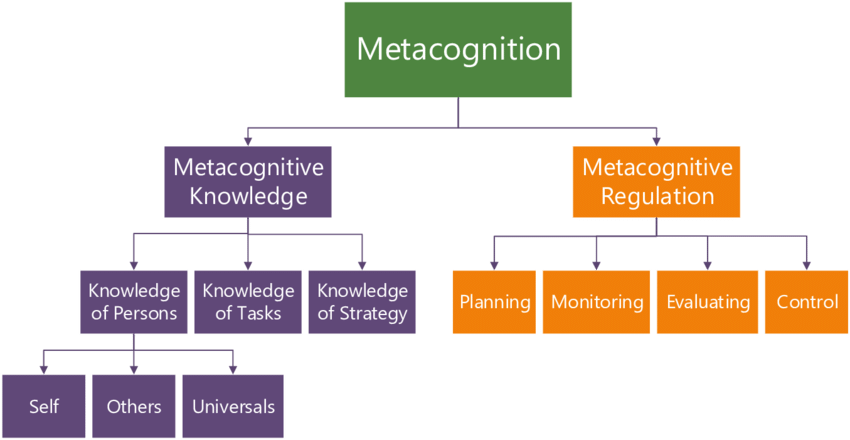In this article you will read about:
Metacognition is a relatively recent concept used by both cognitive psychology and education sciences, which attracts attention to the role of the subject in knowledge and in obtaining a real awareness of the knowledge by using self-control, self-appreciation and self-perfecting of one’s cognition. Metacognition is, in broad terms, thinking about thinking.
If by this inquiry into the nature of the understanding, I can discover the powers thereof; how far they reach; to what things they are in any degree proportionate; and where they fail us, I suppose it may be of use to prevail with the busy mind of man to be more cautious in meddling with things exceeding its comprehension; to stop when it is at the utmost extent of its tether; and to sit down in a quiet ignorance of those things which, upon examination, are found to be beyond the reach of our capacities.
John Locke Tweet
History and Definition
The father of metacognition, J.H. Flavell, defines it broadly as “knowledge about knowledge“, which refers to the information an individual possesses about his cognitive processes and products.
Flavell discovered this concept while researching metamemory. Metamemory is the knowledge an individual has about the process of memorisation – for example, the fact that one knows that a specific type of information requires more repetition, that the material which is organised is better remembered and so on – and about the strategies used in memorising different types of material.
J. Delacour offers us the following definition of metacognition: “Metacognition is the capacity of representing one’s cognitive activity, of evaluating the means and the results, of adjusting it to different types of problems or situations by deliberating choosing strategies and rules and, especially, of establishing the true or false character of some representations.“
Metacognitive knowledge
The analyses by J.H. Flavell, continued by A.L. Brown on the process of metacognition, highlighted two main components of it: metacognitive knowledge and metacognitive abilities.

Metacognitive knowledge represents the declarative aspect of metacognition and it includes the beliefs and knowledge the subject has on the phenomena related to cognition. This type of knowledge is differentiated into three categories: knowledge about persons, knowledge about tasks and knowledge about strategies.
Knowledge about persons are also segmented into three types:
Intraindividual
This part is about measuring internal aspects of a single person – made of the beliefs one possesses about himself. For example, he can think that he has a better visual memory than a echoic one (related to sounds) or that he performs better while he has to do verbal tasks than numerical or spatial tasks.
Interindividual
This segment is measuring aspects of different persons – are the comparisons that we make between individuals. For example, a student that is comparing himself to his deskmate and reaches the conclusion that he is better than him at, say, phisics.
Universal Aspects
This is the knowledge that we possess regarding human thinking in general. For example, we know due to the discoveries made by cognitive psychology that the level of information processing directly influences the efficiency of learning.
Equilibrium occurs when a child’s schemas can deal with most new information through assimilation. However, an unpleasant state of disequilibrium occurs when new information cannot be fitted into existing schemas (assimilation).
Equilibration is the force which drives the learning process as we do not like to be frustrated and will seek to restore balance by mastering the new challenge (accommodation). Once the new information is acquired the process of assimilation with the new schema will continue until the next time we need to make an adjustment to it.
He who knows others is wise. He who knows himself is enlightened.
Lao-Tzu Tweet
Knowledge about tasks is about knowing the objectives of the task, its requirements, and its level of difficulty and also about being clear on the factors and conditions required for the task to be completed.
Knowledge about strategies involves general expertise and specific information about learning strategies and where, when and how to use them.
All this metacognitive knowledge – metaknowledge – is stored in memory and is activated automatically or, on the contrary, voluntarily and consciously, depending on the task’s requirements.
Metacognitive Regulation
Metacognitive abilities – the management of mental activity – define the procedural aspect of metacognition and refer to the activities we undertake to control and monitor our thinking. According to A.L. Brown, managing mental activity is done by specific processes and strategies of planning, control/monitoring and regulation, being closely tied to the situation at hand and the task.
Only the human brain can deliberately change perceptions, change patterns, invent concepts and tolerate ambiguity.
Edward de Bono Tweet
Planning strategies are anticipating and deciding how the task will be achieved. Schöenfeld (1987) demonstrated that beginners in mathematics spend significantly less time on such planning activities than experts when trying to solve a problem. This is causing them to stray on the wrong paths, which are often more costly in time and money.
Control/monitoring strategies involve the surveillance of the current undergoing activity by checking the progress, the correctness of the obtained results, identifying errors and evaluating the strategies used.
Regulation strategies refer to the interventions we decide on making based on what we found out in the control/monitoring phase.
Book recommendations
Further Developments
The research inspired by the analysis of Flavell and Brown tried to discover the way in which these two components operate at the level of the mental processes involved in learning, as well as establish the links between metacognition and other variables such as affectivity, motivation and cognitive style. The study of cognition has been focused on three main branches:
Metamemory
Is what the subject knows about what he is memorising.
Metacomprehension
Is what the subject knows about his comprehension processes.
Metasolving of Problems
This the knowledge or the beliefs the subject has about his mental processes when he is solving problems.
Mental Health
In the context of mental health, the interest in metacognition emerged from a concern for an individual’s ability to understand their own mental status compared to others and cope with the source of their distress.
Metacognition reinforces one's subjective sense of being a self and allows for becoming aware that some of one's thoughts and feelings are symptoms of an illness.
P.H. Lysaker Tweet
Metacognition brings many unique insights into the normal daily functioning of a human being. These insights into an individual’s mental health status can profoundly affect the overall prognosis and recovery. It also demonstrates that a lack of these insights compromises ‘normal’ functioning. This leads to less healthy functioning.
In the autism spectrum, there is a profound deficit in the Theory of Mind. In people who identify as alcoholics, there is a belief that the need to control cognitions is an independent predictor of alcohol use over anxiety. Alcohol may be used as a coping strategy for controlling unwanted thoughts and emotions formed by negative perceptions. This is sometimes referred to as self-medication.
Conclusion
Adequate knowledge and apt utilization of Metacognition strategies will improve both instructors and learners. On top of this, as we have seen, it can prevent or help the rehabilitation of mental disorders characterized by unmanaged styles and structures of thinking patterns.
We can safely assume that a strong factor to success is self-esteem: believing you can do it, believing you deserve it, believing you will get it. Strongly related to this is the concept of self-efficacy developed by Albert Bandura. Both metacognition and self-efficacy, relatively new structures erected by modern psychology, can add to self-improvement and the journey to your personal success.
Reflect your thoughts
Click on the icon to see all your thoughts in the Dashboard.
We strongly recommend that you note down any thoughts related to Metacognition, such as linked behaviours, emotions, situations or other associations you make. You can later view these in your Dashboard or Reflect pop-ups to compare them with your present behaviours so you can change or adapt them and continue your Evolution. Read more about this feature and how it can help you.
Media Credits
- Featured image for The Science of Metacognition: How Your Brain Learns: artwork by Matthieu Bourel.
- Featured image for Quote by John Locke: Medusa, collage artwork by Lynn Skordal.
- Featured image for Quote by Lao-Tzu: collage artwork by Emilia Elfe.
- Featured image for Quote by Edward de Bono: collage artwork The Human Wreckage.
- Featured image for Quote by P.H. Lysaker: artwork by Eugenia Loli.




